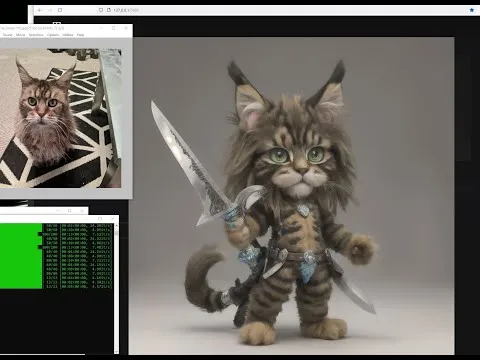
Artificial Intelligence of Things Foundations 
This course provides an introduction to the Artificial Intelligence of Things (AIoT) ecosystem, covering the fundamentals of AIoT in large enterprises. Participants will gain an understanding of the components, architecture, and applications of AIoT. ▼
ADVERTISEMENT
Course Feature
![]() Cost:
Cost:
Free
![]() Provider:
Provider:
Udacity
![]() Certificate:
Certificate:
No Information
![]() Language:
Language:
English
Course Overview
❗The content presented here is sourced directly from Udacity platform. For comprehensive course details, including enrollment information, simply click on the 'Go to class' link on our website.
Updated in [March 06th, 2023]
This course provides an overview of Artificial Intelligence of Things (AIoT) technologies. Participants will learn the fundamentals of AIoT, including the key components of the AIoT Framework and why it is important. Participants will also apply the AIoT Playbook's key elements to evaluate various types of AIoT use cases, such as the Digital OEM Model, the Digital Equipment Operator Model, the Platform Model, and the Hybrid Model. Additionally, participants will learn how to implement an appropriate business strategy based on the use case and business requirements, as well as how to assess the scalability of a business model for a specific use case.
Real-world case studies will be used to assess how organisations implement a variety of AIoT business models to meet product/solution requirements. Participants will also learn the technical requirements for developing and deploying AI, IoT, and Digital Twin technologies, as well as how to use data strategies in the design of AIoT systems to optimise data-driven learning capabilities throughout the development process. The course will also cover the design of AIoT products using Agile V-Model principles, as well as the application of Continuous Integration / Continuous Delivery (CI/CD) concepts to the development, testing, and deployment of AIoT systems. Finally, participants will learn about the AIoT-related trust and security challenges, as well as how DevSecOps works in various use cases.
[Applications]
After completing this course, participants should be able to apply the fundamentals of AIoT technologies to evaluate various use cases and develop an appropriate business strategy. They should be able to assess how organisations implement AIoT business models to meet product/solution requirements, and design the architecture of AIoT products using Agile V-Model principles. Participants should also be able to apply Continuous Integration / Continuous Delivery (CI/CD) concepts to the development, testing, and deployment of AIoT systems, and determine the AIoT-related trust and security challenges.
[Career Paths]
1. AIoT Engineer: AIoT Engineers are responsible for designing, developing, and deploying AIoT systems. They must have a deep understanding of AI, IoT, and Digital Twin technologies, as well as the ability to design and implement architectures that are secure, scalable, and reliable. As AIoT technology continues to evolve, AIoT Engineers will need to stay up-to-date on the latest trends and technologies.
2. AIoT Data Scientist: AIoT Data Scientists are responsible for leveraging data to create insights and drive decisions. They must have a deep understanding of data science, machine learning, and AIoT technologies. As AIoT technology continues to evolve, AIoT Data Scientists will need to stay up-to-date on the latest trends and technologies.
3. AIoT Product Manager: AIoT Product Managers are responsible for managing the development and deployment of AIoT products. They must have a deep understanding of AIoT technologies, as well as the ability to develop and implement product strategies that are secure, scalable, and reliable. As AIoT technology continues to evolve, AIoT Product Managers will need to stay up-to-date on the latest trends and technologies.
4. AIoT Security Engineer: AIoT Security Engineers are responsible for ensuring the security of AIoT systems. They must have a deep understanding of security protocols, as well as the ability to design and implement secure architectures. As AIoT technology continues to evolve, AIoT Security Engineers will need to stay up-to-date on the latest trends and technologies.
[Education Paths]
1. Bachelor's Degree in Artificial Intelligence: A Bachelor's Degree in Artificial Intelligence is a great way to get started in the field of AIoT. This degree will provide students with a comprehensive understanding of the fundamentals of AI, including machine learning, deep learning, natural language processing, and computer vision. Students will also learn about the various AIoT frameworks and technologies, as well as the ethical implications of AI. This degree is becoming increasingly popular as AI technology continues to develop and become more widely used.
2. Master's Degree in AIoT: A Master's Degree in AIoT is a great way to further your knowledge and skills in the field. This degree will provide students with a deeper understanding of the various AIoT frameworks and technologies, as well as the ethical implications of AI. Students will also learn about the various AIoT business models and strategies, as well as the technical requirements for developing and deploying AI, IoT, and Digital Twin technologies. This degree is becoming increasingly popular as AI technology continues to develop and become more widely used.
3. Doctorate Degree in AIoT: A Doctorate Degree in AIoT is the highest level of education available in the field. This degree will provide students with a comprehensive understanding of the various AIoT frameworks and technologies, as well as the ethical implications of AI. Students will also learn about the various AIoT business models and strategies, as well as the technical requirements for developing and deploying AI, IoT, and Digital Twin technologies. This degree is becoming increasingly popular as AI technology continues to develop and become more widely used.
4. Certificate in AIoT: A Certificate in AIoT is a great way to get started in the field of AIoT. This certificate will provide students with a comprehensive understanding of the fundamentals of AI, including machine learning, deep learning, natural language processing, and computer vision. Students will also learn about the various AIoT frameworks and technologies, as well as the ethical implications of AI. This certificate is becoming increasingly popular as AI technology continues to develop and become more widely used.
Course Syllabus
Introduction to AIoT
Business Strategy
Business Execution
Technical Execution
Course Provider

Provider Udacity's Stats at AZClass
Artificial Intelligence of Things Foundations introduces the IoT ecosystem, covering the fundamentals of AIoT in large enterprises. Learners can learn the basic principles of AIoT technology, such as what is AIoT and the key components of AIoT framework. They can understand why the AIoT framework is important and apply the key elements of the AIoT playbook to evaluate various types of AIoT use cases. Learners can also learn how to implement appropriate business strategies based on use cases and business requirements and determine the scalability of business models for specific use cases. They can use real-world case studies to evaluate how organizations implement various AIoT business models to meet product/solution needs.
Discussion and Reviews
0.0 (Based on 0 reviews)
Explore Similar Online Courses

Free Microsoft Word Tutorial - Word Office 2016 Ultimate basics for beginners

Learn How To Build Websites Using Site Factory

AI Companions: Social Impact - How tech like ChatGPT virtual companions and robots will change us

AI art with Blender and Stable Diffusion w& midjourney Model

EASY Offline Stable Diffusion Model Training make your own custom LoRA with Kohya simple process!

Ultimate Stable Diffusion AI art Course (beginner to pro)

Stable Diffusion Deforum: Going Viral on TikTok & Instagram

Stable Diffusion 101 : Beginners Guide To Building AI Art

Stable Diffusion Masterclass: AI Assisted Art Generation

Introduction to Stable Diffusion for Developers & Designers

ULTIMATE FREE LORA Training In Stable Diffusion! Less Than 7GB VRAM!


Start your review of Artificial Intelligence of Things Foundations